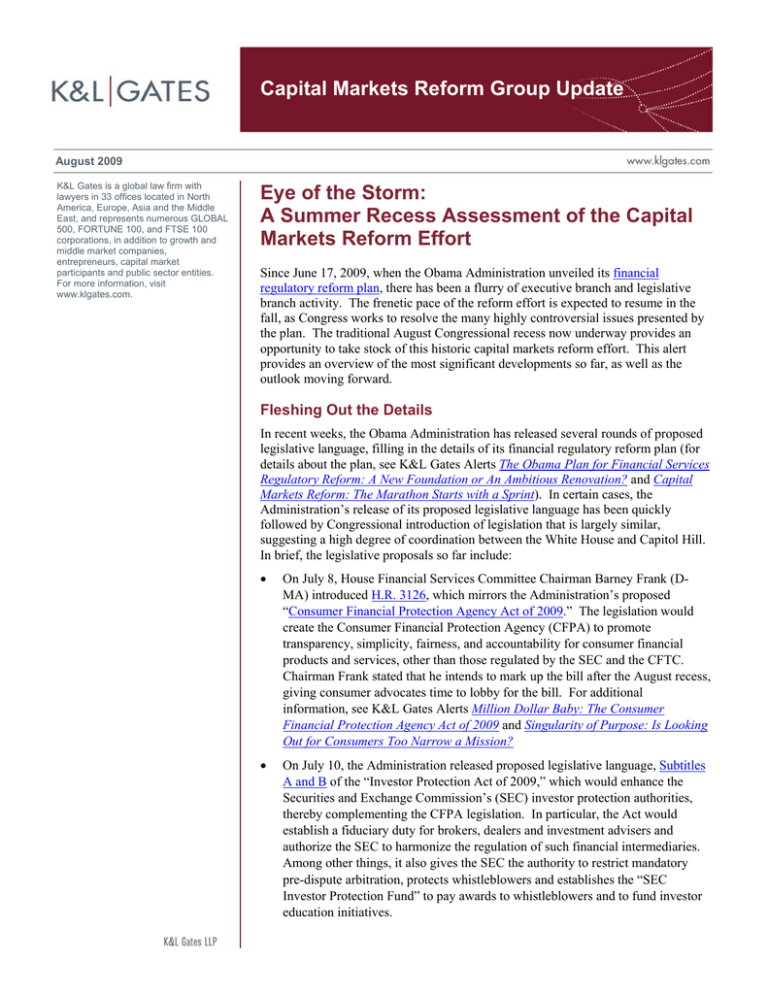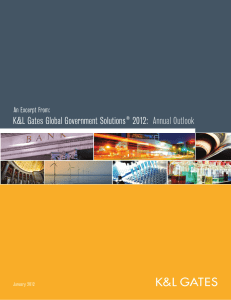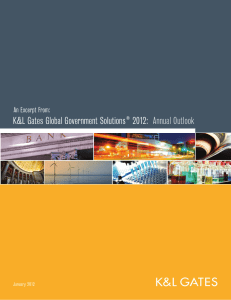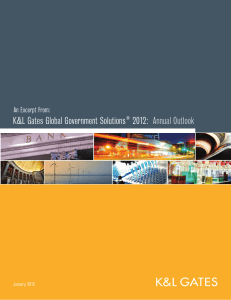
Capital Markets Reform Group Update
August 2009
K&L Gates is a global law firm with
lawyers in 33 offices located in North
America, Europe, Asia and the Middle
East, and represents numerous GLOBAL
500, FORTUNE 100, and FTSE 100
corporations, in addition to growth and
middle market companies,
entrepreneurs, capital market
participants and public sector entities.
For more information, visit
www.klgates.com.
Eye of the Storm:
A Summer Recess Assessment of the Capital
Markets Reform Effort
Since June 17, 2009, when the Obama Administration unveiled its financial
regulatory reform plan, there has been a flurry of executive branch and legislative
branch activity. The frenetic pace of the reform effort is expected to resume in the
fall, as Congress works to resolve the many highly controversial issues presented by
the plan. The traditional August Congressional recess now underway provides an
opportunity to take stock of this historic capital markets reform effort. This alert
provides an overview of the most significant developments so far, as well as the
outlook moving forward.
Fleshing Out the Details
In recent weeks, the Obama Administration has released several rounds of proposed
legislative language, filling in the details of its financial regulatory reform plan (for
details about the plan, see K&L Gates Alerts The Obama Plan for Financial Services
Regulatory Reform: A New Foundation or An Ambitious Renovation? and Capital
Markets Reform: The Marathon Starts with a Sprint). In certain cases, the
Administration’s release of its proposed legislative language has been quickly
followed by Congressional introduction of legislation that is largely similar,
suggesting a high degree of coordination between the White House and Capitol Hill.
In brief, the legislative proposals so far include:
•
On July 8, House Financial Services Committee Chairman Barney Frank (DMA) introduced H.R. 3126, which mirrors the Administration’s proposed
“Consumer Financial Protection Agency Act of 2009.” The legislation would
create the Consumer Financial Protection Agency (CFPA) to promote
transparency, simplicity, fairness, and accountability for consumer financial
products and services, other than those regulated by the SEC and the CFTC.
Chairman Frank stated that he intends to mark up the bill after the August recess,
giving consumer advocates time to lobby for the bill. For additional
information, see K&L Gates Alerts Million Dollar Baby: The Consumer
Financial Protection Agency Act of 2009 and Singularity of Purpose: Is Looking
Out for Consumers Too Narrow a Mission?
•
On July 10, the Administration released proposed legislative language, Subtitles
A and B of the “Investor Protection Act of 2009,” which would enhance the
Securities and Exchange Commission’s (SEC) investor protection authorities,
thereby complementing the CFPA legislation. In particular, the Act would
establish a fiduciary duty for brokers, dealers and investment advisers and
authorize the SEC to harmonize the regulation of such financial intermediaries.
Among other things, it also gives the SEC the authority to restrict mandatory
pre-dispute arbitration, protects whistleblowers and establishes the “SEC
Investor Protection Fund” to pay awards to whistleblowers and to fund investor
education initiatives.
Capital Markets Reform Group Update
•
•
•
On July 15, the Administration released the
“Private Fund Investment Advisers Registration
Act of 2009.” The proposed legislative
language would generally require advisers to
hedge funds and other private pools of capital,
including advisers to private equity funds and
venture capital funds, to register with the SEC
under the Investment Advisers Act of 1940.
Previously, on June 16, Senate Banking
Committee Securities Subcommittee Chairman
Jack Reed (D-RI) introduced S. 1276, a similar
bill requiring private fund advisers to register.
For additional information, see K&L Gates
Alert The Obama Administration’s Proposal for
the Registration of Investment Advisers to
Private Investment Funds: The Private Fund
Investment Advisers Registration Act of 2009.
The Administration, on July 21, released its
credit rating agency reform proposal. Subtitle
C of the “Investor Protection Act of 2009”
would enhance the SEC’s supervisory authority
over credit rating agencies, and increase
transparency over the agencies and rating
process. This proposed legislation would
replace the current voluntary registration system
with mandatory registration with the SEC of all
credit rating agencies. The proposed bill would
also bring about significant adjustments in the
manner in which these agencies are
compensated, with an emphasis on a new system
of payment that structures payment over time
based on the reliability of the agencies’ ratings.
For additional information, see the upcoming
K&L Gates Alert on credit rating agency
reform.
The Administration’s proposed systemic risk
legislation was sent to Capitol Hill on July 22,
2009. The proposal would create a Financial
Services Oversight Council to facilitate
coordination of financial regulatory policy and
resolution of disputes and identify emerging
risks in financial markets. In addition, the
Federal Reserve would be given the authority to
supervise and regulate all financial firms that are
found to pose a threat to financial stability based
on their size, leverage, and interconnectedness
to the financial system. Under the proposal,
such “Tier 1 FHCs” will be subject to
consolidated supervision and regulation,
including Federal Reserve examination of
subsidiaries. For additional information, see
K&L Gates Alert A New Playing Field for the
Banking Industry: The National Banking
Supervisor and Systemic Risk.
•
On July 23, the Administration proposed the
“Federal Depository Institutions Supervision
and Regulation Improvements Act of 2009,” the
“Payment, Clearing, and Settlement
Supervision Act of 2009,” and the “Resolution
Authority for Large, Interconnected Financial
Companies Act of 2009.” The legislation
would create a National Bank Supervisor
through the consolidation of the Office of Thrift
Supervision (OTS) and the Office of the
Comptroller of the Currency (OCC), and would
also eliminate the thrift charter and thrift
holding company framework. In addition, the
legislation would provide the government with
emergency authority to resolve any large,
interconnected financial firm. For additional
information, see K&L Gates Alert A New
Playing Field for the Banking Industry: The
National Banking Supervisor and Systemic
Risk.
•
On July 30, House Financial Services Chairman
Barney Frank (D-MA) and House Agriculture
Chairman Collin Peterson (D-MN) presented a
concept paper on how to regulate over-thecounter (OTC) derivatives. The concept paper
includes seven key principles for Federal
legislation of OTC derivatives trading: robust
oversight of dealers and markets; mandatory
clearing of OTC derivatives, with exceptions;
strengthening capital and margin requirements;
reining in certain types of speculation;
preventing regulatory arbitrage; establishing a
Financial Services Oversight Council that
would promptly resolve disputes; and
enforcement of new and existing laws and
regulations governing OTC derivatives. The
wholesale rethink of OTC derivative practices
and market structure has been a principal
feature of the Obama Administration’s
Financial Regulatory Reform mandate.
August 2009
2
Capital Markets Reform Group Update
Congressman Michael McMahon (D-NY), along
with thirteen co-sponsors, recently introduced
H.R. 3300, the most comprehensive bill on OTC
derivatives trading and exchanges to date. H.R.
3300, the “Derivative Trading Accountability
and Disclosure Act,” is generally consistent with
a Frank-Peterson concept paper. For additional
information, see K&L Gates Alert OTC
Derivatives Legislation Continues to Take
Form.
•
On July 31, just before departing for the summer
recess, the House passed H.R. 3269, the
“Corporate and Financial Institution
Compensation Fairness Act of 2009,” based
largely on the Administration’s legislative
proposals on “say-on-pay” and compensation
committees. As the Senate moves forward, it
could adopt one of two approaches. S. 1074,
introduced by Senator Charles Schumer (DNY), takes a holistic approach by including
additional corporate governance provisions,
such as eliminating staggered boards and
dividing the duties between the board chairman
and CEO. Alternatively, Senate Banking
Committee Chairman Christopher Dodd (D-CT)
introduced a bill in the last Congress that
focused primarily on say-on-pay. For additional
information, see K&L Gates Alert The
Economic Crisis: Broader Executive
Compensation Reforms Coming Soon.
The rapid pace at which the reform proposals have
been released has been matched with equally
ambitious Committee hearing schedules. Over the
past several weeks, the House Financial Services
Committee has held more than a dozen hearings or
markups on a variety of issues.i The Senate Banking
Committee has also had an active schedule.ii Both
Committees will continue hearings and markups in
the fall, after Congress returns from its August
recess.
Outlook
At a National Press Club (NPC) speech on July 27,
2009, Chairman Frank observed that the regulatory
framework has not kept up with innovations in
financial products and services. The resulting
problem has been “non-regulation” (as opposed to
deregulation) and the objective of the regulatory
reform proposals is to mitigate the risks associated
with these innovations. In this context, Chairman
Frank has said that the proposal to create the CFPA
will move forward soon, with some minor
modifications. However, in recent weeks, the
proposal has attracted increasing opposition from
the financial services industry and also the Federal
Reserve, which argues that it should retain control
of consumer protection oversight. One possible
compromise could be to give rulemaking authority
to the CFPA, while keeping examination and
compliance responsibilities with the banking
regulators. In any case, it is likely that any
compromise will maintain the SEC and CFTC
carveout as proposed by the Administration,
allowing both entities to continue oversight of
issues already under their jurisdiction.
Another area of disagreement is the systemic risk
architecture. As noted above, the Administration
proposes to give the Federal Reserve responsibility
for supervision and regulation of large,
interconnected firms, while the Financial Services
Oversight Council develops and coordinates
systemic risk policy. FDIC Chairman Sheila Bair
has instead suggested a framework in which the
Financial Services Oversight Council would have
stronger oversight authority and would work in
concert with existing regulators. Both proposals
have attracted criticism from Congress, as Members
have been skeptical of the ability of the Federal
Reserve or the proposed Council to function in these
roles. Clearly, that debate has yet to be resolved.
During his NPC speech, Chairman Frank stated that
he expects the House to vote on the regulatory
reform proposals in September or October, with
Senate consideration expected soon thereafter. He
noted that the goal is to have the reforms signed into
law by President Obama by the end of the year.
Despite Chairman Frank’s ambitious timeline, it
seems likely that Congressional consideration of the
regulatory reform proposals will ultimately play out
in fits and starts as other legislative priorities come
into play. For example, the health care reform
debate has been postponed to the fall, after the
House recessed without holding a floor vote and the
Senate recessed without the Senate Finance
Committee, which has jurisdiction over substantial
August 2009
3
Capital Markets Reform Group Update
portions of the health care bill, having come to an
agreement. In addition, the Senate deferred much of
its consideration of the climate change legislation
until after Labor Day.
Born, John Thompson, Bob Graham, Heather
Murren, Byron Georgiou, Peter Wallison, Doug
Holtz-Eakin, and Keith Hennessey. The FCIC is to
issue its report and recommendations to Congress in
December, 2010. Therefore, regardless of the
outcome on the pending proposals, more reforms
are sure to come.
Certain pieces of the reform proposal, particularly
with respect to federal regulation of insurance or
harmonization of securities and futures regulation,
seem calculated to extend the discussion into next
year or even the next Congress. Finally, it must be
noted that members of the Financial Crisis Inquiry
Commission (FCIC) were appointed on July 15.
The FCIC is modeled after the Great Depression-era
Pecora Commission that led to enactment of the
1933 Securities Act and the 1934 Securities
Exchange Act. Former California State Treasurer
Phil Angelides was appointed as chairman, and
former House Ways and Means Committee
Chairman Bill Thomas was appointed vice
chairman. The other FCIC members are: Brooksley
In order to address these unprecedented changes,
K&L Gates has established a Capital Markets
Reform Group that consists of designated partners
in each of the firm’s relevant practice areas across
the full spectrum of capital markets issues. By
coordinating across all of these disciplines, K&L
Gates will be able to provide unequaled service and
insights to firm clients as these new laws and
implementing regulations are written (see K&L
Gates Newsstand K&L Gates Launches Capital
Markets Reform Group).
•
i
Witness testimony is available by clicking the hyperlinks.
•
July 28: H.R. 3269, Corporate and Financial
Institution Compensation Fairness Act of 2009
•
July 24: Regulatory Perspectives on the Obama
Administration’s Financial Regulatory Reform
Proposals-Part Two
•
July 22: Regulatory Perspectives on the Obama
Administration’s Financial Regulatory Reform
Proposals
•
July 21: Systemic Risk: Are Some Institutions
Too Big to Fail and If So, What Should We Do
About It?
•
July 17: Industry Perspectives on the Obama
Administration’s Financial Regulatory Reform
Proposals
•
July 16: Regulatory Restructuring: Safeguarding
Consumer Protection and the Role of the Federal
Reserve (Domestic Monetary Policy and
Technology Subcommittee)
•
July 15: Banking Industry Perspectives on the
Obama Administration’s Financial Regulatory
Reform Proposals
•
July 10: A Review of the Administration’s
Proposal to Regulate the Over-the-Counter
Derivatives Market
•
July 9: Regulatory Restructuring: Balancing the
Independence of the Federal Reserve in
Monetary Policy with Systemic Risk Regulation
(Domestic Monetary Policy and Technology
Subcommittee)
•
July 6: Community and Consumer Advocates’
Perspectives on the Obama Administration’s
Financial Regulatory Reform Proposals
•
•
ii
June 25: Improving Consumer Financial Literacy
under the New Regulatory System (Financial
Institutions and Consumer Credit Subcommittee)
June 24: Regulatory Restructuring: Enhancing
Consumer Financial Products Regulation
June 18: The Administration’s Plan for the
Restructuring of the American Financial Regulatory
System
Witness testimony is available by clicking the hyperlinks.
•
August 5: Examining Proposals to Enhance the
Regulation of Credit Rating Agencies
•
August 4: Strengthening and Streamlining Prudential
Bank Supervision
•
July 29: Protecting Shareholders and Enhancing
Public Confidence by Improving Corporate
Governance
•
July 28: Regulatory Modernization: Perspectives on
Insurance
•
July 23: Establishing a Framework for Systemic Risk
Regulation
•
July 15: Regulating Hedge Funds and Other Private
Investment Pools
•
July 14: Creating a Consumer Financial Protection
Agency: A Cornerstone of America’s New Economic
Foundation
•
June 22: Over-the-Counter Derivatives: Modernizing
Oversight to Increase Transparency and Reduce
Risks
•
June 18: The Administration’s Proposal to Modernize
the Financial Regulatory System
August 2009
4
Capital Markets Reform Group
For more information on K&L Gates’ Capital Markets Reform Group, please contact one of the
professionals listed below.
Diane E. Ambler
diane.ambler@klgates.com
+1.202.778.9886
Philip M. Cedar
phil.cedar@klgates.com
+1.212.536.4820
Daniel F. C. Crowley
dan.crowley@klgates.com
+1.202.778.9447
Vanessa C. Edwards
vanessa.edwards@klgates.com
+44.(0)20.7360.8293
Edward G. Eisert
edward.eisert@klgates.com
+1.212.536.3905
David H. Jones
david.jones@klgates.com
+1.704.331.7481
Steven M. Kaplan
steven.kaplan@klgates.com
+1.202.778.9204
Sean P. Mahoney
sean.mahoney@klgates.com
+1.617.261.3202
J. Matthew Mangan
matt.mangan@klgates.com
+1.415.249.1046
Philip J. Morgan
philip.morgan@klgates.com
+44.(0)20.7360.8123
Mary C. Moynihan
molly.moynihan@klgates.com
+1.202.778.9058
Anthony R.G. Nolan
anthony.nolan@klgates.com
+1.212.536.4843
Clair E. Pagnano
clair.pagnano@klgates.com
+1.617.261.3246
Lawrence B. Patent
lawrence.patent@klgates.com
+1.202.778.9219
Karishma Shah Page
karishma.page@klgates.com
+1.202.778.9128
Anchorage Austin Beijing Berlin Boston Charlotte Chicago Dallas Dubai Fort Worth Frankfurt Harrisburg Hong Kong London
Los Angeles Miami Newark New York Orange County Palo Alto Paris Pittsburgh Portland Raleigh Research Triangle Park
San Diego San Francisco Seattle Shanghai Singapore Spokane/Coeur d’Alene Taipei Washington, D.C.
K&L Gates is a global law firm with lawyers in 33 offices located in North America, Europe, Asia and the Middle East, and represents numerous
GLOBAL 500, FORTUNE 100, and FTSE 100 corporations, in addition to growth and middle market companies, entrepreneurs, capital market
participants and public sector entities. For more information, visit www.klgates.com.
K&L Gates comprises multiple affiliated partnerships: a limited liability partnership with the full name K&L Gates LLP qualified in Delaware and
maintaining offices throughout the U.S., in Berlin and Frankfurt, Germany, in Beijing (K&L Gates LLP Beijing Representative Office), in Dubai,
U.A.E., in Shanghai (K&L Gates LLP Shanghai Representative Office), and in Singapore (K&L Gates LLP Singapore Representative Office); a
limited liability partnership (also named K&L Gates LLP) incorporated in England and maintaining offices in London and Paris; a Taiwan general
partnership (K&L Gates) maintaining an office in Taipei; and a Hong Kong general partnership (K&L Gates, Solicitors) maintaining an office in Hong
Kong. K&L Gates maintains appropriate registrations in the jurisdictions in which its offices are located. A list of the partners in each entity is
available for inspection at any K&L Gates office.
This publication is for informational purposes and does not contain or convey legal advice. The information herein should not be used or relied upon
in regard to any particular facts or circumstances without first consulting a lawyer.
©2009 K&L Gates LLP. All Rights Reserved.
August 2009





